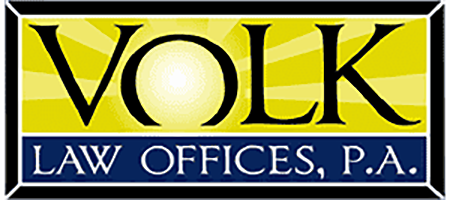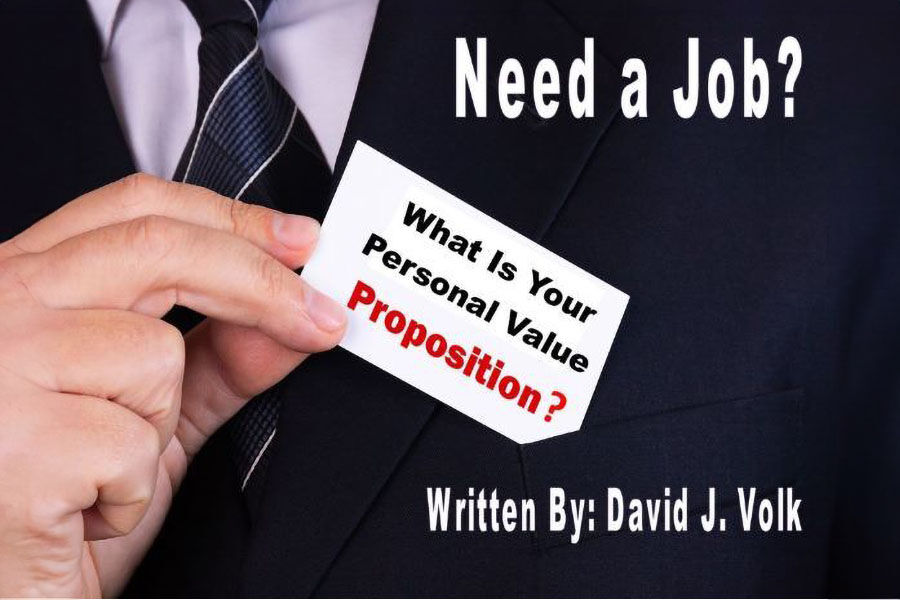Need a Job? What Is Your Personal Value Proposition?
Posted: May 6th, 2020
David Volk, April 23, 2020
These are difficult times. Massive business closures, furloughs with no guarantee of re-employment, and firings. If you lost your job or you still have your job, but if feels unsafe, what should you do?
You should do what everyone should do whether they are looking for a job, thinking of looking for a job, trying to hang on to a job, or trying to advance in a job. You need to reflect on your personal value proposition. What is a value proposition? Let’s look at company value propositions first. When you understand why a business needs one, you will realize you should have one as well. It’s a jungle out there. Companies and people are fighting for scarce resources. You want to stand out from the crowd.
Investopedia defines a company value proposition as “an easy-to-understand reason why a customer should buy a product or service from that particular business. A value proposition should clearly explain how a product fills a need, communicate the specifics of its added benefit, and state the reason why it's better than similar products on the market. The ideal value proposition is to-the-point and appeals to a customer's strongest decision-making drivers.”
I want to give potential clients a very good reason for hiring Volk Law Offices as their law firm. Why? We are honest, care about seeking great outcomes for our clients, have talented veteran lawyers using well defined rules for work including use of time tested legal form language wherever possible in a proactive environment such as our seven day rule, which says we will get things done seven days before they are due, and by evaluating cases on the front end using a structured format before we begin work instead of just diving in. That is a small part of our value proposition. The work we do is not cheap, so we give clients added value through the principles described above. Also, I manage the firm and am a fairly tough boss if you do not follow our standard procedures. Standard procedures also reduce mistake risks. We meet regularly to discuss best practices such as how to take our clients from trusting us to having real affection for us. When they know we care about them, they usually appreciate it and view us as more than mere functionaries doing fungible work.
So, what is your personal value proposition which you can use to get a job, keep a job, or do a better job and climb the ladder? If you like the job and want to get or keep it, quit thinking about what the company can do for you. Put yourself in the company’s shoes and define what is in it for the company if you are part of their team. I have looked at a lot of resumes and cover letters over the years and done a lot of interviews. The common theme: most people do not want to make my company more successful; they want to be on my payroll so they can pay for their stuff. It is extremely disheartening seeing that over and over and over again. Many do not even look at our website in any depth before coming in for an interview. When I was trying to find a lawyer job, my cover letters, all those years ago, explained that hiring me would create a “mutually beneficial relationship”, and I would explain why they would benefit.
How do you figure out your value proposition? Writing in HBR.org November 17, 2011, Bill Barnett put it this way:
Here are four steps to develop a strong PVP:
1. Set a clear target. The PVP begins with a target, one that needs what you have to offer. You’ll prefer some directions, not others. Targeting will make you most effective.
2. Identify your strengths. It may sound obvious, but what you know and what you can do are the foundation of your PVP. Hone in on what those are.
3. Tie your strengths to your target position. Don’t leave it up to the employer to figure out how your strengths relate to what she needs. Let your PVP tightly connect you to the position. Connect the dots for her. Consider her perspective and know why she should hire you or promote you.
4. Provide evidence and success stories. Your strengths may be what an employer is “buying”, but your achievements are the evidence you have those strengths. They make your case convincing. Some people prepare a non-confidential portfolio to showcase that evidence in a vivid way. They collect reports they wrote that had impact. They pull together facts on measurable achievements such as sales growth or cost reduction.
Put it in a letter. A value proposition is different than a cover letter, or it can be included in your cover letter. Here are some great elements:
A strong value proposition letter will get you noticed. Alison Doyle, in Personal Value Proposition Statement Letter Examples, December 06, 2019 in thebalancecareers.com says:
- Brainstorm your assets: Make a list of the key skills, experiences, and accomplishments that make you a valuable and unique job candidate. Ask friends and colleagues what they see as your greatest skills and strengths. Look at reference letters and evaluations from past employers to see what skills and strengths people tend to notice in you. From this list, select a few key skills, experiences, or accomplishments that best relate to your target position.
- Use values: Employers want to know what tangible results they will get by hiring you. A great way to demonstrate how you can add value to a company is to include numbers in your letter.
- Focus on the present: Unlike a resume, a value proposition letter should not focus on the past. Tell employers what you can do for them, not what you’ve done for others. Using the present tense rather than the past tense is a great way to stay focused on the present and look towards the future.
- Individualize your letter: Be sure to tailor each value proposition letter to fit the particular company and job position. Make sure your letter addresses what the particular employer wants, and what you have to offer them.
- Include a link: Consider including a link to a blog, LinkedIn page, or other URL that contains your resume in your letter. This will allow an interested employer to access more information about you.
- Be concise: Your letter should be no longer than 100-150 words. Use bullet points to highlight three or four of the key reasons why you are a unique and valuable job candidate. Each bullet point should be no longer than two lines. Place the strongest bullet point at the top of the letter.
- Be bold: Bold particularly strong words or phrases to catch the employer’s eye.
- Pay attention to formatting: Value proposition letters should be typed in a simple, legible font, such as Times New Roman, size 12. Use simple circular or square bullet points—don’t get too fancy.
She gives some great examples, including this one:
Dear Ms. Smith,
Are you looking for an experienced, analytics-driven leader capable of developing and managing your online marketing campaigns while generating revenue?
My skills as a Social Media Manager will enhance your reputation as an accessible, customer-friendly company, thereby increasing customers and revenue. Here are some of the high-level achievements I can bring to Pioneer Health Systems within one year:
- Increase brand awareness by 20%
- Increase in web page viewers and Facebook and Twitter followers by 35%
- Cut online marketing budget by 10%
I can bring to your company over 10 years of experience of successfully developing online brands. I have included my resume and will call next week to discuss the opportunities I can bring to your company. Thank you.
Get it? Tell them what you will do for them. If you have the job already, show them even more of what you are doing for them. Sell yourself as someone that will make someone else more successful. That creates a mutually beneficial relationship.

